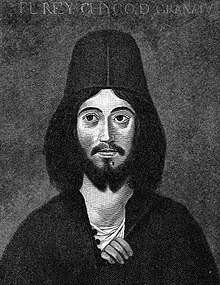Boabdil
| Muhammad XII | |||||
|---|---|---|---|---|---|

Contemporary portrait of Boabdil the last Muslim ruler of Spain created in the 15th century
|
|||||
| Sultan of Granada | |||||
| 1st reign | 1482–1483 | ||||
| Predecessor | Abu l-Hasan Ali | ||||
| Successor | Abu l-Hasan Ali | ||||
| 2nd reign | 1487 – January 2, 1492 | ||||
| Predecessor | Muhammad XIII | ||||
| Born | 1460? Alhambra, Granada |
||||
| Died | 1533 Fes, Morocco |
||||
| Consort | Morayma (Maryam bint Ibrahim al-atar) | ||||
| Issue | Ahmed Aixa (Sor Isabel de Granada) Yusef |
||||
|
|||||
| House | Nasrid dynasty | ||||
| Father | Abu l-Hasan Ali, Sultan of Granada | ||||
| Mother | Aixa | ||||
| Religion | Islam | ||||
| Full name | |
|---|---|
| Abu `Abdallah Muhammad XII (Arabic: أبو عبد الله محمد الثاني عشر) |
Abu `Abdallah Muhammad XII (Arabic: أبو عبد الله محمد الثاني عشر Abū ‘Abd Allāh Muḥammad al-thānī ‘ashar) (c. 1460 – c. 1533), known to the Castilians as Boabdil (a Spanish rendering of the name Abu Abdullah), was the twenty-second and last Nasrid ruler of Granada in Iberia.
Son of Abu l-Hasan Ali, sultan of the Emirate of Granada, Muhammad succeeded him in 1482.
Muhammad XII soon sought to gain prestige by invading Castile. He was taken prisoner at Lucena in 1483. Meanwhile, his father returned to power and then in 1485, his uncle Muhammed XIII, also known as Abdullah ez Zagal.
He only obtained his freedom and support to recover his throne in 1487 by consenting to hold Granada as a tributary kingdom under the Catholic monarchs and not to intervene in the Siege of Málaga (1487), in which Málaga was taken by the Christians.
1487 saw the fall of Baza and Málaga. 1489 saw the fall of Almuñécar, Salobreña and Almería. By the beginning of 1491, Granada was the only Muslim-governed city in Spain.
In 1491, Muhammad XII was summoned by Ferdinand and Isabella to surrender the city of Granada, which was besieged by the Castilians. Eventually, on 2 January 1492, Granada was surrendered. In most sumptuous attire the royal procession moved from Santa Fe to a place a little more than a mile from Granada, where Ferdinand took up his position by the banks of the Genil. A private letter written by an eyewitness to the bishop of León only six days after the event recorded the scene:
...
Wikipedia
